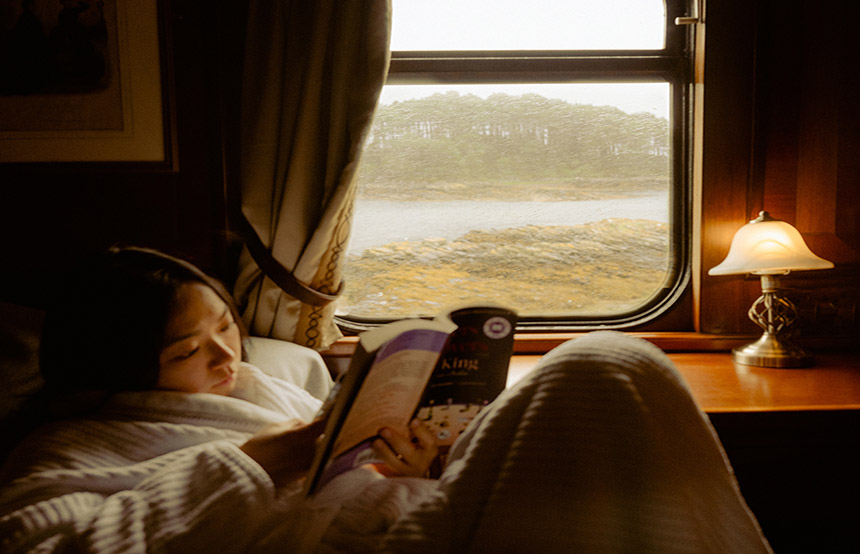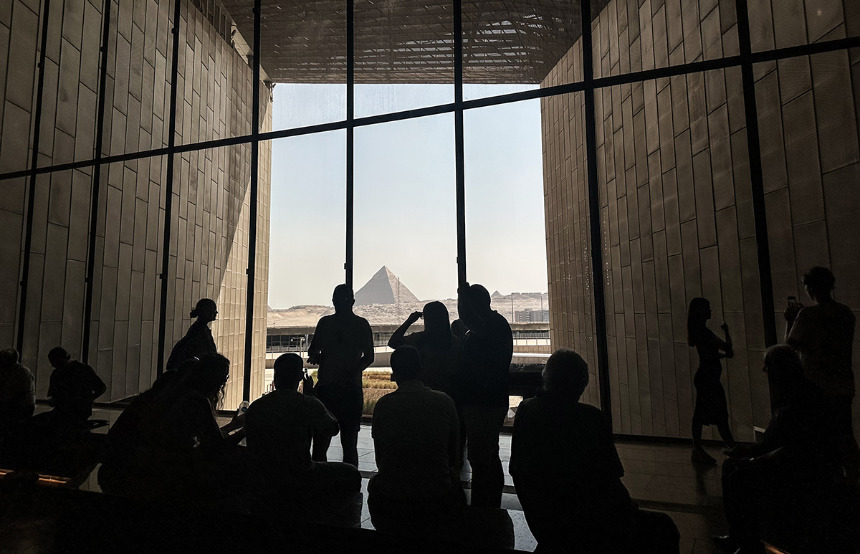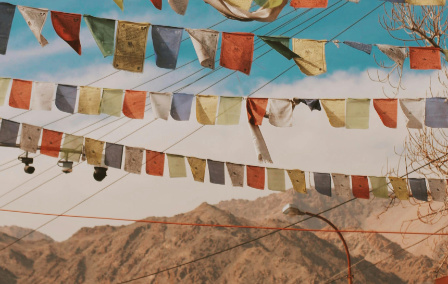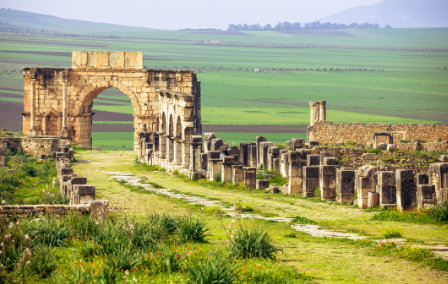
Published 28th Jun. 2022
Reading time
When searching for holiday inspiration, Instagram and the wider web are obvious places to start. But when classic travel stories such as A. A. Gill’s The Golden Door: Letters to America and The Great Railway Bazaar by Paul Theroux exist, we don’t think overly edited influencer shots stand much chance. And neither does our co-founder, Tom Barber. With a background in journalism and travel, he’s just the person you need for reading recommendations and examples of best travel writing to whet your travel tastebuds. Read on for a roundup of his favourite travel books...
For me, this is one of the greatest works of travel writing, describing 18-year-old Leigh Fermor's walk from the Hook of Holland to Istanbul in 1933 and 1934. The writing, the route, the era, the adventures and the people Paddy Leigh Fermor meets all combine to astonishing effect, but the secret sauce that secures these two books' top spot for me is that while the journey was taken in the 1930s, Fermor's diary of the journey was lost for decades and only found in the 1970s. The resulting combination of a young man's adventures and escapades across Europe - as the threat of another World War loomed - recounted by an older, wiser man with the gift of hindsight, works to devastating effect. After his death, the final part of the journey was written up as The Broken Road by Leigh Fermor's esteemed biographer Artemis Cooper. And while it’s a fine work, it only goes to show how astonishingly good a writer the polymathic Leigh Fermor was himself.
Anything and everything by A.A. Gill is - as far as I'm concerned - near flawless, be that his restaurant reviews (that rarely contained more than a paragraph or two about the actual restaurant), TV reviews or, of course, his travel writing. Original Travel had the great honour of sending him on two trips that he wrote up in typically beautiful style for The Times (The Turban Warrior, about a trip to Oman) and Vanity Fair (on Stockholm, available in his collection of travel writing A.A. Gill is Further Away) but my favourite is his book in praise of America - The Golden Door: Letter to America. There's no denying Gill could be an ocean-going snob, and you'd imagine him having a healthy disdain for the USA, but this series of essays explores parts of America - both geographical and psychological - that reveal his deep love for, and understanding of, that extraordinary country. This love was in part instilled in Gill by his godfather Alistair Cooke, who presented the 15-minute radio show ‘Letter from America’ (hence the book title) on the BBC for an astonishing 58 years. I would recommend that anyone visiting the USA reads this book before they go. It will almost certainly engender a newfound respect and understanding of a country that has so influenced our world.
Not a particularly original choice for a list of the best travel writing to include (many of these aren't, admittedly, but they are classics for a reason) but The Great Railway Bazaar remains one of the great travelogues of all time. The premise itself was beautiful in its simplicity: 'it was my intention to board every train that chugged into view from Victoria Station in London to Tokyo Central, and to come back again via the Trans-Siberian Express', and Theroux's love of trains chimes with our own Original Travel belief that this is the most civilised of all forms of travel. We couldn't put it quite as eloquently as American-born Theroux, though, in one of the finest of all opening sentences. 'Ever since childhood, when I lived within earshot of the Boston and Maine, I have seldom heard a train go by and not wished I was on it.' But as so often in travel writing, it's the people and not the places that shine. As Theroux again puts so well. 'I sought trains. I found passengers.'
Chatwin's staccato style of short, sharp sentences (something I've never been accused of) takes a bit of getting used to, but it works to perfection when describing the weird and wonderful landscapes (and equally weird and wonderful people inhabiting them) of Patagonia. He then intermittently launches into elongated asides about particularly unusual characters or incidents that reinforce the sense that this is a far-out place in all meanings of the phrase.
If you're worried about trying to tackle a book that's over a thousand pages long, 'Journey' - the first chapter of Black Lamb and Grey Falcon - is the most sublime introduction to a supremely talented writer. West describes the train journey from Salzburg to Zagreb and the various characters (and their national characteristics) of the other passengers in her and her husband's carriage. It is utterly engrossing. Anyone who visits one or more of the former constituent nations of one-time Yugoslavia (Slovenia, Croatia, Serbia, Montenegro, Bosnia Herzegovina, Kosovo and North Macedonia) would do well to read this to get an extraordinary insight into a fascinating part of the world. It’s probably best read on a Kindle or tablet to save on weight.
There have been few more evocative descriptions of a way of life than Thesiger's account of his time living and travelling with the nomadic Bedouin of the Empty Quarter, the vast sand sea that spans the border between latter-day Oman, Yemen and the UAE. It’s also a very poignant description of the way modernity was impinging on the Bedouin way of life and a fine record of their beliefs and practices in a fast-changing world. The Empty Quarter itself - the largest dune desert in the world - also plays a starring role, as Thesiger explains how much life there is in a seemingly lifeless place.
More and more poignant with every passing year, this 1997 book is the story of Dalrymple's journey from Mount Athos in Greece around the Levant (the wonderfully old-fashioned name for what is essentially the eastern end of the Mediterranean) to Egypt, chronicling the fate of the remaining Christian communities in countries where once they would have made up a sizeable proportion of the population. It's a beautifully written account of the relationship between Christians, Muslims and Jews in a region of huge historical significance, and the sections on Syria are particularly sad given the ongoing civil war.
In my humble opinion, Mark Twain is one of the funniest writers ever, and never more so than in this - his first book – a travel writing classic about his voyage aboard the Quaker City from the US to Europe and onto the Holy Land. In among some moments of seriousness, Twain mercilessly mobs up the inhabitants of every nation the cruise visits but reserves his most arch mockery for his fellow American citizens accompanying him on board the Quaker City.
Morris secured the ultimate travel journalistic scoop by reporting on Hillary and Tenzing's conquering of Everest, and went on to write a series of beautiful and thoughtful travel books, historical texts and memoirs, including about the transsexualism that saw her transition from male to female in the 1970s. This collection is the perfect beginner's guide to the descriptive prowess of one of the greatest travel writers Britain has ever produced.
Practical advice and inspiration for your next trip

As Tom Holland (the esteemed historian, not Spiderman) so succinctly put it in the first edition of our magazine, Original Traveller, ‘Egypt is where tourism began’. And the next chapter in the history of tourism in Egypt is about to begin. We’re always looking for a reason to shout about this captivating country, and this November, we have the perfect excuse: the long-awaited opening of the Grand Egyptian Museum (GEM).
3rd November 2025 - Egypt Culture

Everyday life can be chaotic. Our favourite antidote? Escaping to one of the silent and sacred corners of the world. Whether hiking mystical mountains or observing ancient rituals, spiritual holidays offer a chance to reconnect and slow down. From the cloud-kissing monasteries of Meteora to the heart of Mexico’s Maya culture, read on to discover our favourite spiritual escapes around the world... Meteora monasteries, Greece Himalayas, India Yucatan Peninsula, Mexico Nairobi and Laikipia, Kenya Meteora monasteries, Greece Best for:
24th July 2025 - Culture

Any trip to Fes should include a day out to the Roman ruins of Volubilis, probably the largest and best-preserved ruins in Morocco. With scenery reminiscent of Russell Crowe’s homecoming in ‘Gladiator’ (more for the surrounding countryside than for the grisly welcome he got), Volubilis is a must-see for history buffs and lovers of picturesque vistas alike. Find out why you should visit in our Volubilis guide… 1.
23rd April 2025 - Morocco Culture

Our team of destination experts will get to know you and your unique requirements for your holiday

We work with you to build an ultra-personalised holiday itinerary with your choice of accommodation, experiences and activities

All of our holidays include little extras designed to make a big difference to your trip, from fast-tracking you through airport check-in and security to our network of local Concierges